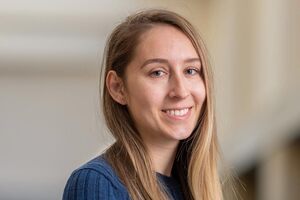
Angela Chesler is a Ph.D. candidate in Peace Studies & Political Science. She’s also a Research Fellow at Harvard University’s Belfer Center for Science and International Affairs. In her research, Angela is looking at post-conflict violence in self-governing states, and the impact of this violence on the environment. In this student Q&A, Angela talks about her personal background that led her to study peace and her hopes for continuing teaching the new generation of peacebuilders.
What do you want to discover through your research?
Broadly speaking, I study the causes and downstream consequences of political violence. I’m particularly interested in disentangling how efforts to promote peace can generate unexpected incentives for violence. I’m also passionate about the environment, and another facet of my research examines how climate change shapes the dynamics and repertoires of political violence. In this area, I focus on the interaction of environmental shocks in conflict zones to understand how climate change impacts society in the context of extreme fragility.
What made you interested in studying Peace in the first place?
Like so many others, I come from a family that immigrated to the US because of violence in their home country. Because political violence is a big part of my family’s story, it’s always been a strong academic and professional interest of mine. This interest deepened through experiences I’ve had working with refugee communities, whose stories were also intimately linked to violence. This ultimately led me to work at the United States Institute of Peace, where I had a front-row seat to research-informed peacebuilding in conflict zones. The realization that critical inquiry and research are part and parcel to effective peacebuilding really resonated with me and animated my interest in peace research as a career.
What are some of the biggest challenges and hopes regarding your research?
The biggest challenge in my research is grappling with social and political complexities linked to violent conflict. Because violence is so deeply entrenched in the structures of society, there are no simple causes or solutions, which can sometimes be overwhelming and discouraging. At the same time, disentangling these complex dynamics is essentially the defining challenge of peace studies, and it's one peace scholars must meet.
My biggest hope is that my research will have a positive impact on the world. Peacebuilding requires comprehensive and coordinated action across all levels and sectors of society. To this end, I believe that effective peacebuilding relies on a cumulative body of research that engages different perspectives and approaches to understand the causes of violence and conditions of peace. I hope that my research—in conjunction with the work of other peace scholars—can contribute positively to the broader peacebuilding project by illuminating different dynamics of violence and peace.
What do you wish to do after graduation?
After receiving my Ph.D., I look forward to advancing peace research as a university professor. I’m excited about the opportunity to continue researching these topics and to work more closely with policymakers and practitioners. I’m also thrilled to be working with students. I’m particularly passionate about supporting students as they develop the knowledge, tangible skills, and experiences they need to promote a more peaceful world. As a university professor, I'm looking forward to playing a role—however small it may be—in preparing the next generation of peacebuilders.
What is lacking in the current peace curriculum or discussions?
I have a lot of admiration for how peace studies has embodied the principle of self-reflexivity and evolved as a field in recent years. I’m particularly thinking about the inclusion of previously marginalized topics like the environment, diversity, and decolonizing the field. Of course, there is certainly a long way to go in all of these areas and others. But one thing I would like to see more of, particularly in terms of curriculum, is conversations about how we can equip students with the tangible skills and experiences to become agents of peace. I find that many students are passionate and extremely knowledgeable, but are less confident about how to translate this into a real-world impact. I would love to see more engagement with how we can do more to integrate deep knowledge and critical thinking with practical skills to better prepare the next generation of peacebuilders.